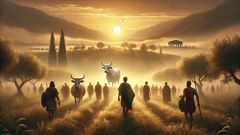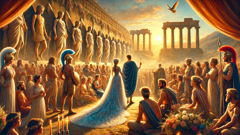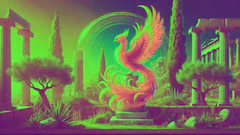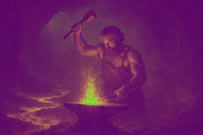Introduction
In the land where the gods once walked among mortals and every river, grove, and mountain bore the memory of heroes, there lived a young prince whose destiny was intertwined with both tragedy and greatness. The story of Cadmus, exiled son of Agenor, begins not with triumph, but with the aching absence of his beloved sister Europa, whose abduction by Zeus set the wheels of fate in motion. From the opulent courts of Tyre, Cadmus set out on a quest that would change the map of Greece forever, guided by prophecies and divine omens that led him far from everything he had known. As his sandals pressed into foreign soils, he became both wanderer and seeker, driven by loyalty and shaped by every trial he met. This is a story where monsters rise from sacred springs, gods disguise themselves in plain sight, and wisdom is found not only in victory but in the perseverance to endure loss and embrace the unknown. Through mountain passes shrouded in morning mist, across meadows golden with the promise of new beginnings, Cadmus’s journey reveals that greatness is rarely given—it must be wrested from the grip of the impossible. With each step, the boundaries between the mortal and the divine blur, and the city of Thebes, born from the teeth of a dragon, emerges as a testament to the resilience of those who dare to dream. In this retelling, ancient echoes come alive, and Cadmus’s odyssey unfolds with all the vividness and drama of an epic painted in words.
The Oracle's Prophecy and the Cow with the Moon Mark
Cadmus’s story truly begins not with the loss of Europa, but with a question: where should a brother look when the world refuses to offer answers? After years scouring the coasts and highlands for his sister—her abduction by the thunder-god now a whispered tale—Cadmus found himself standing before the shadowy threshold of the Oracle at Delphi. The cave's entrance was ringed with the aromatic smoke of burning laurel, and the Pythia, draped in veils and mystery, welcomed him with eyes as old as the stones themselves. The quest, she intoned, was not to find Europa, but to seek out a heifer bearing a white moon-shaped mark on her brow. Where that cow lay down to rest, there would his destiny be fulfilled and a city rise.

With neither bitterness nor certainty, Cadmus accepted this new purpose. He and his faithful companions crossed into lands unknown, where forests hummed with cicadas and distant peaks shimmered like gods half-awake. It was in the wild plains of Phocis that he first saw her—the cow, white as cloud, her brow kissed by a crescent shadow. She moved with the slow, measured calm of something set apart by prophecy. Each step she took pressed fresh life into the earth, and Cadmus followed, never urging, only trusting.
For days, the heifer wandered—through thickets and streams, past gnarled olives and fields heavy with poppies. Cadmus and his men trailed after, sleeping beneath stars that seemed to whisper of fate. The locals watched the strangers with guarded curiosity, for travelers were not uncommon, but men who followed cows at the command of Delphi were rare indeed. Children giggled at their procession; old women nodded, murmuring that omens had returned to the land.
At last, as dawn scattered gold across the meadows of Boeotia, the cow paused beside a gentle rise ringed by ancient trees. She knelt and lay down, breathing out a long, contented sigh. Cadmus understood instantly: this was the place, the heart of his journey. He marked the spot with stones and a silent vow. Here, a city would rise—not for Europa, not for glory, but because destiny demanded it. Yet even as hope flared within him, he sensed that his trials had only just begun.
The Slaying of the Dragon and the Sowing of the Teeth
No sooner had Cadmus chosen the site for his city than the first of his challenges revealed itself. His men, eager to consecrate the place with a sacrifice to Athena, were sent to draw water from a spring in a shaded glade. The spring, it turned out, belonged not to mortals but to a serpent—a monstrous dragon said to be the offspring of Ares himself. Its scales shimmered like obsidian, its eyes burned with venomous light, and its presence turned the very air cold.

The men never returned. Only a single scream echoed through the trees before silence fell, as if the forest itself dared not witness what happened next. Cadmus, undaunted by dread, seized his spear and entered the shadows where the spring gurgled. There he beheld the dragon coiled among the reeds, jaws gaping, blood still glistening on its fangs. For a moment, the two regarded each other—man and monster, each the instrument of a god.
The battle was brutal and swift. The dragon lunged, hissing, its massive coils snapping trees as if they were kindling. Cadmus dodged, rolling through mud and roots, his spear flashing as he thrust at the beast’s exposed neck. The gods, it seemed, watched with bated breath; thunder rumbled far off, a warning or encouragement, he could not tell. Again and again, Cadmus evaded the dragon’s wrath, fighting with every ounce of strength born from exile and longing. With a final desperate prayer to Athena, he drove his spear beneath the scaled jaw and into the brain. The dragon writhed, shuddered, and then stilled forever.
As Cadmus caught his breath among the carnage, Athena herself appeared—radiant and stern. She instructed him not to mourn his lost companions, for they had become part of a greater plan. He was to sow the dragon’s teeth into the earth, just as Demeter sowed seeds in spring. With trembling hands, Cadmus pried the ivory teeth from the beast’s jaws and scattered them in the blood-soaked ground. The soil began to boil and churn. From it rose armed warriors, helmed and shielded, fully grown and burning with battle-fury.
The newly sprung men turned upon each other in a frenzy, blades flashing in the dappled light. Cadmus, remembering Athena’s wisdom, hurled a great stone into their midst. Confused, the warriors fought one another until only five remained—stalwart, bloodied, but suddenly calm. These five became Cadmus’s first citizens, loyal not by birth but by shared creation and ordeal. From death, life had come; from violence, the first seed of civilization had been sown.
Cadmus’s Trials, Divine Intervention, and the Birth of Thebes
Victory brought neither peace nor simple reward. The gods, never content to let mortals rest easily, had more in store for Cadmus. Though Athena had aided him and given him his new people, the blood of Ares’s offspring stained the ground. Soon, the war-god himself arrived in a fit of rage, demanding retribution for the death of his monstrous child. Cadmus was seized by invisible hands, dragged into a dreamlike realm where pain and vision blurred together.

There, surrounded by spectral warriors and flashes of divine wrath, Cadmus was made to serve Ares for a cycle of years—some say eight, others a full decade. The tasks were cruel, punishing; he labored in fields of iron, hunted phantoms in forests where time twisted, all while his nascent city took shape in the mortal world. Yet even here, endurance became his greatest ally. Cadmus learned humility, patience, and the hard-won wisdom that suffering could teach. When at last Ares relented, he did so not out of pity but respect: here was a mortal who would not break.
The gods were not finished. To Cadmus was given a bride—Harmonia, daughter of Ares and Aphrodite. Their wedding was celebrated on the plains of Boeotia with splendor never before seen. Gods and mortals alike gathered for the feast: Apollo played his lyre; Hephaestus gifted Harmonia a necklace wrought with secret magic; Demeter blessed the fields. The air shimmered with music and promise. For a moment, the world held its breath as love bridged the chasm between divine quarrel and mortal hope.
Thebes rose from these foundations. Cadmus and the five warriors built its walls stone by stone, laboring by day and dreaming by night of what the city might become. Towers climbed skyward; gates carved with scenes of myth guarded the way; temples rose in honor of gods who had both hindered and helped. People gathered from distant lands—farmers, artisans, poets—drawn by tales of a city born from dragon’s teeth and blessed by Olympian hands.
Yet shadows clung to even the brightest moments. The necklace of Harmonia, beautiful and cursed, would one day bring ruin to her descendants. The line of Cadmus would know both glory and tragedy, for such is the price of greatness in a world watched over by capricious gods. Still, under Cadmus’s rule, Thebes flourished—a beacon of culture, wisdom, and resilience. In its marketplaces, people spoke of dragons and heroes; in its temples, they prayed for guidance and mercy. Through all this, Cadmus remained not only founder but father—his perseverance etched into every stone of the city that would bear witness to both legend and history.
Conclusion
So the legend of Cadmus endures—an exile who became a founder, a slayer of monsters who learned wisdom through hardship, and a mortal whose story bridges earth and Olympus. His city, Thebes, would go on to witness both splendor and sorrow, its walls echoing with the footsteps of heroes yet to come—Oedipus, Dionysus, Antigone. But Cadmus’s legacy is more than stone and myth; it’s the reminder that perseverance and courage can coax order from chaos, that even loss can plant seeds for new beginnings. Thebes stands as a testament not only to prophecy fulfilled but to the indomitable spirit of those who refuse to surrender to despair. In every corner of its ruins and every echo of its name, Cadmus’s journey lives on—a story woven from longing, bravery, and the hope that, somewhere beyond suffering, greatness can be found.


















